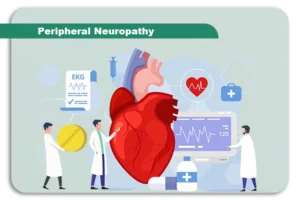How Does Diabetes Affect Your Health?

How Does Diabetes Affect Your Health? In this comprehensive exploration, we will delve into the intricacies of diabetes, discussing its types, complications such as diabetic retinopathy and neuropathy, and its profound impact on cardiovascular health.
💉 What Is Diabetes?
Diabetes is a chronic condition that affects millions of people worldwide, significantly impacting their health and well-being. This metabolic disorder disrupts the body’s ability to regulate blood sugar levels, leading to various complications affecting different organs and systems.
Diabetes mellitus, commonly known as diabetes, is a group of metabolic disorders characterized by elevated blood sugar levels over an extended period. The primary cause of diabetes is either the insufficient production of insulin, the hormone responsible for regulating blood sugar, or the body’s ineffective use of insulin. There are two main types of diabetes: Type 1 and Type 2.
➜ Type 1 Diabetes
Type 1 diabetes is a form of autoimmune illness in which the immune system incorrectly assaults and kills insulin-producing beta cells in the gland that produces insulin. This leads to an absolute insulin deficiency, requiring individuals with Type 1 diabetes to rely on external insulin administration. Onset usually occurs in childhood or adolescence, and management involves a careful balance of insulin, diet, and exercise.
➜ Type 2 Diabetes
Type 2 diabetes is prevalent and normally develops in adulthood, but it can occur in younger people. In this instance, either the human body generates inadequate insulin or the cells become resistant to its activities. Risk factors for Type 2 diabetes include genetics, sedentary lifestyle, poor diet, and obesity. Lifestyle modifications, including diet, exercise, and sometimes medication, are essential components of managing Type 2 diabetes.
🌡️ Diabetic Retinopathy
Diabetic retina, a vision-related disorder, is one of the most serious consequences of diabetes. Prolonged high blood sugar levels damage the blood capillaries in the retina, causing impaired vision and, in severe cases, blindness.
Regular eye examinations are crucial for early detection and intervention, as diabetic retinopathy often progresses without noticeable symptoms until irreversible damage has occurred. Treatment for diabetic retinopathy usually involves laser therapy or injections of medication. Regular monitoring and proper diabetes management can help reduce the risk of developing diabetic retinopathy.
➜ Diabetic Neuropathy
Diabetic neuropathy is a group of nerve disorders affecting various body parts, causing pain, tingling, and numbness. There are several types of diabetic neuropathy, each with its unique set of symptoms and impact on health. Diabetes can also lead to nerve damage, which can lead to further damage and disability.
Early diagnosis and treatment of diabetic neuropathy are important to reduce the risk of complications and long-term damage. Treatment may include medication, lifestyle changes, and physical therapy. Regular check-ups and monitoring of blood sugar levels are also important to prevent the development of neuropathy.
➜ Peripheral Neuropathy
Peripheral neuropathy is the most common form of diabetic neuropathy, affecting the nerves in the extremities, such as the feet and hands. Symptoms include tingling, burning sensations, and numbness. As the condition progresses, it may lead to loss of sensation, making individuals more susceptible to injuries and infections.
Treatment for peripheral neuropathy may include lifestyle changes, physical therapy, and medication. In severe cases, surgery may be necessary. It is important to seek treatment early to prevent further nerve damage. Regular check-ups with a doctor are also recommended. Providing a reliable solution for maintaining a balanced and healthy lifestyle, Amaryl M 1 Mg effectively controls blood sugar levels.
➜ Autonomic Neuropathy
Autonomic neuropathy affects the nerves that control involuntary bodily functions, including heart rate, digestion, and blood pressure. This can result in a range of complications, such as gastroparesis (delayed stomach emptying), cardiovascular issues, and sexual dysfunction. Other complications include difficulty regulating body temperature, abnormal sweating, and dry mouth.
Autonomic neuropathy can also cause weakness and numbness in the arms and legs. Treatment for autonomic neuropathy usually involves medications, lifestyle changes, and physical therapy. Surgery may also be an option in some cases.
➜ Proximal Neuropathy
Proximal neuropathy, also known as diabetic amyotrophy, affects the hips, thighs, and buttocks. It can cause severe pain, weakness, and difficulty moving the affected muscles. While this form of neuropathy is less common, it can significantly impact mobility and quality of life. Treatment usually involves physical therapy and medication to help manage the pain and other symptoms. Surgery may be necessary in some cases. Early diagnosis and treatment are key to managing this condition.
➜ Focal Neuropathy
Focal neuropathy is characterized by the sudden onset of nerve damage in a specific body area, causing muscle weakness or joint pain. While focal neuropathy typically improves over time, it can be debilitating during its duration. Treatment for focal neuropathy may include physical therapy, medications, and nerve stimulation. In some cases, surgery may be necessary.
An underlying medical condition can also cause focal neuropathy, so it is important to consult a doctor to determine the cause and develop a course of treatment. Lifestyle changes such as limiting caffeine intake and avoiding repetitive tasks can also help to reduce symptoms. Providing improved glucose control and an intuitive, user-friendly approach, Rybelsus 14 Mg is a convenient once-a-day oral option for Type 2 diabetics.
🤱 Cardiovascular Disease
Diabetes is a major risk factor for cardiovascular disease, including 💓 heart attacks and strokes. The prolonged elevation of blood sugar levels contributes to the development of atherosclerosis, a condition where the arteries become narrowed and hardened due to the buildup of plaques. These plaques can rupture, leading to blood clots that may block blood flow to the heart or brain, resulting in a heart attack or stroke.
👁️🗨️ Click Here To Learn More About Cardiovascular Disease: 
Moreover, diabetes often coexists with other cardiovascular risk factors such as hypertension, abnormal cholesterol levels, and obesity, further increasing the likelihood of heart-related complications. Individuals with diabetes must manage these risk factors through lifestyle modifications, medications, and regular medical check-ups.
👇 Bottom Line
Diabetes is a complex and pervasive condition that can profoundly impact health in various ways. From the disruption of blood sugar regulation to the development of complications like diabetic retinopathy, neuropathy, and cardiovascular disease, the consequences of diabetes are far-reaching.
Early detection, vigilant management, and a commitment to a healthy lifestyle are essential components of minimizing the impact of diabetes on overall health. By understanding the intricacies of this condition, individuals can make informed choices to mitigate risks, enhance their well-being, and work towards a healthier future.



